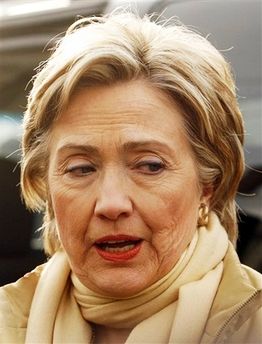Posted on May 31,
2016
Fishy Or Not,
Vince Foster’s Death Matters
by
Daniel
Clark
For the purposes of this discussion, let’s stipulate
that all of the official findings about Vince Foster’s death are correct. Let’s agree that when Donald Trump referred
to it as “fishy,” it really was one of the more outlandish things he has
said. Most of us aren’t in a position to
dispute the forensic evidence.
Furthermore, motivational questions like why Foster drove to Fort Marcy
Park to shoot himself, and why he would transport the gun to the park in an
oven mitt, might have answers that were personal to him, and wouldn’t otherwise
make sense to you and me.
If we dispense with all speculation over the many
peculiar details of the case, and look at those facts that are not in dispute,
we can see that it’s totally reasonable that Foster would become an issue in
the presidential campaign, even if Trump isn’t too clear on exactly why.
 One
point about Foster on which the skeptics have been empirically refuted is in
their disbelief that he had been depressed.
At first, that claim seemed to be unfounded, but official investigations
have since factually established that Foster had sought help for his
depression. What’s really peculiar is
not that Ken Starr took that fact to support the conclusion of suicide, but
that he was so incurious as to why Foster was depressed, and how it related to
his other investigations of the Clintons.
One
point about Foster on which the skeptics have been empirically refuted is in
their disbelief that he had been depressed.
At first, that claim seemed to be unfounded, but official investigations
have since factually established that Foster had sought help for his
depression. What’s really peculiar is
not that Ken Starr took that fact to support the conclusion of suicide, but
that he was so incurious as to why Foster was depressed, and how it related to
his other investigations of the Clintons.
While serving as President Clinton’s deputy White
House counsel, Foster was also employed as Bill and Hillary’s private attorney,
a circumstance that itself placed him in an ethical conundrum, given the
administration’s penchant for dubiously claiming attorney-client
privilege. Exactly when Foster was
working for the American people, and when he was working for the Clintons, was
ill-defined by design.
One of the tasks he performed in his White House
office was to prepare several years’ worth of delinquent tax returns for the
Whitewater Development Corporation, in which the Clintons had partnered with
Jim and Susan McDougal. Concerned that
he couldn’t substantiate the losses Bill and Hillary were claiming on the
venture, he warned that by doing so they might trigger an IRS audit, calling it
“a can of worms you shouldn’t open.”
This assessment was among the documents the
administration eventually turned over to investigators, after first having
ransacked Foster’s office upon learning of his death. What’s not documented is just how the
Clintons took that advice. We do know
that when Foster filed the returns, he didn’t claim any losses, but instead
claimed a $1,000 capital gain from the Clintons’ sale of their share of
Whitewater to Jim McDougal. Are we to
believe that this resolution, which cost the Clintons money, alleviated the
pressure on Foster, or brought more to bear upon him?
Those tax returns were far from the only ethical
problem having to do with Whitewater, nor were they the only facet of it that
involved Foster. It was Foster who had
championed Hillary’s application to join the Rose Law Firm, where she became a
partner by the time that entity represented Madison Guarantee Savings and Loan
before state regulators. Madison had
been purchased by the McDougals, who used it to
partially finance Whitewater, at the expense of the taxpayers who would
ultimately bail that lending institution out.
Foster, who was known to be conscientious about appearances of
impropriety, cannot help but have felt cornered inside that incestuous triangle
comprised of Whitewater, Madison and Rose.
 …
And that’s not all. Arkansas financier
David Hale testified that Bill Clinton had strong-armed him into illegally
obtaining a $300,000 loan for Whitewater through a Small Business
Administration program that was meant to assist low-income and minority
business owners. In 1996, President
Clinton testified on the McDougals’ behalf, denying that he’d ever solicited or
received a loan from Hale, nor had any business dealings with him
whatsoever. The jury, which proceeded to
convict the McDougals of fraud, evidently didn’t
believe him.
…
And that’s not all. Arkansas financier
David Hale testified that Bill Clinton had strong-armed him into illegally
obtaining a $300,000 loan for Whitewater through a Small Business
Administration program that was meant to assist low-income and minority
business owners. In 1996, President
Clinton testified on the McDougals’ behalf, denying that he’d ever solicited or
received a loan from Hale, nor had any business dealings with him
whatsoever. The jury, which proceeded to
convict the McDougals of fraud, evidently didn’t
believe him.
Even some facets of the development that weren’t
illegal were extraordinarily unethical, in that it was essentially a scheme to
bilk retirees out of their life savings.
If an investor missed a single monthly payment, he could be evicted,
with all his payments to date converted to rent, meaning that he no longer had
any investment to show for his money. Another
investor could then be found for that same property. Mind you, Foster would have had nothing to do
with this whole arrangement, if not for his tragic association with the
Clintons.
One piece of evidence that was used to establish
Foster’s state of mind was his alleged suicide note, which is devoid of
fishiness in spite of its having been found in a briefcase that had previously been
searched. It was unfishily
torn to pieces before being put there for safe keeping, and was missing the one
piece that was where his signature might have gone (also not fishy). Because we’re accepting the official
conclusions, we must assume the note to be genuine, so what does it tell us?
The note did not delve into Foster’s internal
struggles, nor did it express concern for his wife and children. Instead, it was a series of paranoid
references to the White House travel office scandal, pathetically bemoaning
that, “The public will never believe in the innocence of the Clintons and their
loyal staff.” (How’s that for
non-fishy?)
“The FBI lied in their report to the [attorney
general],” the note claimed. “The press
is covering up the illegal benefits they received from the travel staff.” …
“the GOP has lied and misrepresented its knowledge and role and covered up a
prior investigation.” … “The [Wall Street
Journal] editors lie without consequence.”
In reality, everybody wasn’t lying about the Clintons,
who themselves were not innocent. There was nothing
illegal about their firing the travel office staff and replacing them with
their own people. In order to justify
these unseemly actions, however, they smeared and persecuted the outgoing
staff, even to the point of having former travel office director Billy Dale
falsely arrested for embezzlement. What
irony that adds to the note’s conclusion, that “Here [in Washington] ruining
people is considered sport.”
Foster’s notes indicate that he doubted any wrongdoing
among the travel office staff; nevertheless, it was he who was tasked with
overseeing their investigation and firing.
Even though Hillary Clinton’s orchestration of the fiasco is well
documented, she denied any involvement, but instead allowed Foster and his
colleague William Kennedy to take the blame.
According to Robert Fiske’s report, Foster was racked with guilt over
the reprimand given to Kennedy, whom he had appointed to conduct the
investigation. If the former First Lady
has ever felt so much as a pang of conscience about it, nobody knows.
If it were discovered that a close associate and very
good friend of Mitt Romney’s had committed suicide after Romney had thrust him
into a series of inextricable ethical tangles, that would have surely been considered
fair game for political exploitation. A
belatedly discovered (and unfishy) suicide note
whining that “The public will never believe in the innocence of the Romneys” would only be considered all the more damning.
Now that Hillary (!) is running for president, and
promising to put Bill in charge of the economy, it has been deemed a breach of
decorum to “dredge up the past” – a standard that has never been applied to any
Republican candidate, nor should it be.
If we didn’t consider the past to be relevant, all we’d have to go on
would be whatever the candidates tell us on a day-to-day basis. For instance, Hillary’s husband once told us
that his would be “the most ethical administration in history.” So how did that work out, Vince?
The Shinbone: The
Frontier of the Free Press